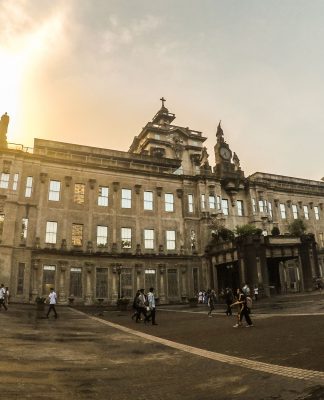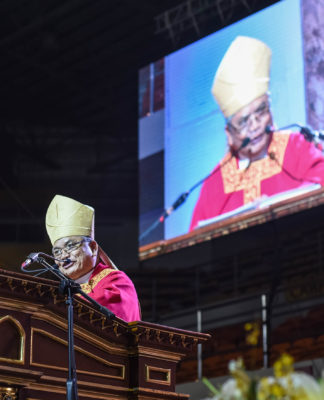IS THERE finally a Catholic vote?
The 2013 elections marked the first time Catholic lay groups banded together to aggressively push the “pro-life” agenda by endorsing candidates and educating Catholic voters.
An alliance of around 50 lay organizations called the “White Vote Movement” endorsed 10 candidates for senator last April in a bid to “protect family and life,” following last year’s passage of the controversial Reproductive Health (RH) Law, which seeks billions of pesos in taxpayers’ money to promote artificial contraception, sterilization and sex education nationwide.
The separate group called Catholic Vote Philippines started the ball rolling last November, launching a voter-education initiative with the aim of encouraging Catholics to “vote as true Catholics.” It did not, however, endorse candidates.
Ahead of White Vote’s endorsements, the Diocese of Bacolod grabbed news headlines with its “Team Buhay-Team Patay” campaign, in which the names of anti- and pro-RH candidates were listed on tarpaulins hanged in front of the diocesan cathedral and other churches.
Lay leaders see this as the emergence of a “Catholic vote,” which has yet to be tested as potent electoral force in a country where 80 percent of the population is Catholic.
El Shaddai
Following a process of “discernment,” White Vote endorsed Nancy Binay, JV Ejercito, Richard Gordon, Gringo Honasan, Marwil Llasos, Mitos Magsaysay, Koko Pimentel, Antonio Trillanes IV, Cynthia Villar and Juan Miguel Zubiri for senators. The bets were chosen based on their positions on family and life issues such as RH, abortion, divorce and same-sex marriage.
But confusion ensued a few days before the elections when it was reported last May 7 that the White Vote had added RH supporters Bam Aquino, a cousin of President Benigno Aquino III, and former senator Ramon “Jun” Magsaysay, Jr. to its list of candidates.
The White Vote Movement was quick to deny the news, saying it was only the “personal endorsement” of the group’s spokesperson, Bro. Mike Velarde, leader of the Catholic Charismatic group El Shaddai, which is also part of the White Vote Movement.
“Our campaign is to eliminate all the pro-RH people,” said lawyer Aurora Santiago, president of the Council of the Laity in the Philippines, on the CBCP News website. “They are really pro-RH people,” she said, referring to Aquino and Jun Magsaysay.
Aside from El Shaddai, White Vote includes the Christian Family Movement, Couples for Christ-Foundation for Family and Life, Family Rosary Crusade, Holy Name Society of the Philippines, Knights of Columbus-Luzon Jurisdiction, Lord’s Flock, Teodora and others.
For Maria Riza Bondal, assistant professor of the University of Asia and the Pacific School of Education and Human Development, the reports were a “classic PR coup,” wherein the White Vote Movement was made to look like it was supporting pro-RH candidates.
Bondal said this was a “form of black propaganda” to deceive people and garner more votes for Aquino allies. “It can cause division in the White Vote Movement by inducing the ire of the participating organizations against Bro. Mike and El Shaddai,” she said.
Nonetheless, these endorsements were not equivalent to an imprimatur of the Catholic Church, Bondal said.
“El Shaddai is only a lay movement. The endorsement of Bro. Mike Velarde cannot be considered as an official endorsement of the entire Catholic Church. Instead, we can regard his action as merely an exercise of his freedom of expression, which is one of the rights upheld by our Constitution,” she said.
Cracks in the White Vote Movement showed early when it decided to endorse only one candidate, Llasos, from the staunchly prolife Ang Kapatiran Party. Two other Kapatiran candidates, Lito Yap David and JC de los Reyes, were left out.
David, a long-time legislative campaigner and De los Reyes, a former Olongapo councilor, were later endorsed by Couples for Christ-Foundation for Family and Life led by Frank Padilla.
The outspoken Lipa archbishop, Ramon Arguelles earlier endorsed all three Kapatiran bets.
Lay organizations have also endorsed partylist groups Ang Prolife, Buhay Hayaang Yumabong or Buhay, and Pacyaw or the Pilipino Association for Country-Urban Poor Welfare.
No ‘bloc voting’
Moves to harness the Catholic vote, however, do not constitute “bloc voting” like that practiced by the Iglesia ni Cristo sect, Church officials said.
At any rate, the White Vote Movement had the right to endorse candidates, said Fr. Melvin Castro, executive secretary of the Catholic Bishops’ Conference of the Philippines (CBCP) Episcopal Commission on Family and Life.
“The White Vote Movement is a lay initiative,” Castro told the Varsitarian. “As such, they are in their legal and moral rights to organize themselves and endorse, if they wish, candidates they discern to be worthy of a Catholic faithful’s support.”
Though Catholics do not vote as a bloc, they can vote as a community based on doctrines affecting social order, Castro said. “It is not a mandated vote but a vote adhering to Catholic teaching,” he said.
Novaliches Emeritus Bishop Teodoro Bacani said in his homily last April 13 during the fellowship night of White Vote Movement that the endorsement of public officials is an election duty that is part of the Church’s mission to follow and spread the teachings of Christ.
“That is a right, it does not violate the guidelines of the Church,” Bacani said.
The White Vote Movement only encourages, but does not impose on Filipino Catholics to vote for prolife candidates, he added.
Bondal said the support of the lay organizations for prolife candidates was not exactly an endorsement, but part of an information campaign. She said she won’t vote for all candidates supported by the White Vote Movement.
“I want to consider other factors,” she said. “I will include some whom I know are prolife but, surprisingly, were not included [on the list of the White Vote Movement].”
Citing social and political philosopher Fr. Joseph de Torre’s book “The Church and Temporal Realities,” Bondal said the Church has the right to guide her followers in its mission.
“We have to affirm that the Church, in accord with the mission entrusted to it by God, has both the right and duty to provide principles for reflection, criteria for judgment and guidelines for action on temporal matters,” she said.
Ranking system
Which candidates can be considered “Catholic candidates”?
An Ateneo professor has devised a ranking system for Catholic Vote Philippines. But the study “Catholicity rankings of Philippine senatorial candidates and political parties using Catholic Vote data,” by Ateneo professor Quirino Sugon Jr., warned that a senatorial candidate’s position on a certain issue may still change after the elections due to influence by the candidate’s political party.
“Whatever the senatorial candidates have declared to be their position today may be modified by their party after the elections,” said Sugon.
Catholic Vote Philippines had rated senatorial candidates according to their individual opposition to RH, divorce and same-sex marriage. For each parameter, a candidate was given a thumbs up icon if he is anti, and a thumbs down if he is pro.
In his methodology, Sugon grouped candidates according to their political parties to determine what the average party vote—taking into account a party’s stand and its candidates’ individual stands on the three critical issues—would look like.
He replaced CVP’s thumbs up and thumbs down icons with +1 for anti and -1 for pro on the three issues: RH, divorce and same-sex marriage.
He added all the ratings for each candidate and made a “Catholicity” scale from -3 to +3 at intervals of 1, with -3 as “anti-Catholic” and +3 as “Catholic.”
Meanwhile, the average party vote, or the “Catholicity” of a political party based on the three issues, was determined by getting the sum of each candidate of a party for each issue.
Sugon then ranked the candidates by adding their individual scores to that of their average party vote, to simulate a political party’s pressure on candidates in legislative deliberations.
“When elected senators vote during deliberations for proposed laws, they do not only vote for what they think is right, but they also take into consideration what they perceive is their party’s stand on the issues,” noted Sugon.
‘Team Buhay, Team Patay and Team Agaw-Buhay’
Lito David, JC de los Reyes, Marwil Llasos, Greco Belgica, Baldomero Falcone, Christian Señeres and Samson Alcantara topped Sugon’s tanking, with each gaining a perfect score in the Catholicity scale.
At the bottom of the list, meanwhile, were Edward Hagedorn, Ricardo Penson, Grace Poe-Llamanzares, Loren Legarda, Juan Ponce Enrile Jr., Teodoro Casiño and Risa Hontiveros, who all received negative scores.
Sugon said those who got perfect scores in the Catholicity scale may be declared as “Team Buhay,” while those who got negative scores belong to “Team Patay.” The rest are “Team Agaw-Buhay.” Kristelle Ann A. Batchelor, Denise Pauline P. Purugganan and Gracelyn A. Simon














